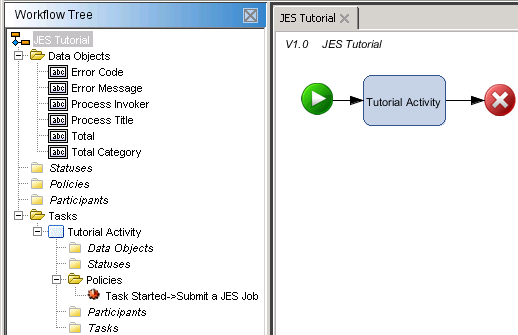Submit a JES Job Policy Example
This example illustrates a simple workflow with a single task. The task executes the Submit a JES Job policy, which sends a single input parameter. The response is stored in the output data object named Total, which is a text type object.
The following figure shows the workflow tree and workflow diagram for this example.
The workflow has root-level data objects
for the input, response, and error value data objects.

The code used in Invoke SAS Code Policy Example was registered
in metadata as a stored process. In this example, a JES stored process task references that code. The data objects
used by the Submit JES Job policy have the following properties:
|
Data Object Label
|
Type
|
Value
|
|---|---|---|
|
Total
|
Short Text
|
None (It is set by the policy.)
|
|
Total Category
|
Short Text
|
sales |
|
Error Code
|
Short Text
|
None (It is populated
if an error occurs.)
|
|
Error Message
|
Short Text
|
None (It is populated
if an error occurs.)
|
The policy definition
associated with the task is as follows:
|
Policy Property
|
Value
|
|---|---|
|
Name
|
Task Started
->Submit
a JES Job
|
|
Event
|
Task Started
|
|
Action
|
Submit a JES Job
|
|
Description
|
This policy is used to submit a JES Job.
|
|
Job Name
|
SAS Projects/MidTier
Services/Workflow/TestSPJESPolicyJob
|
|
Input
|
JES Tutorial/Total Category
|
|
Output
|
JES Tutorial/Total
|
|
Error Code
|
JES Tutorial/Error Code
|
|
Error Message
|
JES Tutorial/Error Message
|
The final response stored in the Total output data object is
33851566.
Copyright © SAS Institute Inc. All Rights Reserved.
Last updated: March 5, 2020